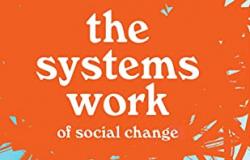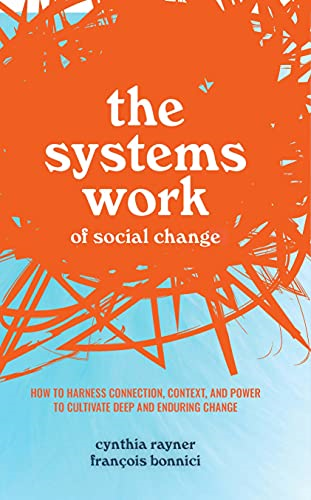Book Review - The Systems Work of Social Change

The Systems Work of Social Change: How to Harness Connection, Context, and Power to Cultivate Deep and Enduring Change by Cynthia Rayner and Francois Bonnic. 2022. Oxford University Press.
Following on yesterday’s post on a new guide to Systems Thinking and Practice, this was the last and most interesting of my Christmas break catch-up reads. It also had the longest title. In full: ‘The Systems Work of Social Change: How to Harness Connection, Context, and Power to Cultivate Deep and Enduring Change’. (I think the punctuation is wrong, but as this is OUP, maybe it’s an Oxford comma).
Cynthia Rayner and Francois Bonnici, both based in South Africa, pull together a wealth of great case studies from around the world and pull out of them some very practical answers for that super-tricky question ‘so the world is complex, what do we do differently?’ The audience is ‘our industry of social change’, which they estimate at 10 million NGOs, contributing an average 4.5% of global GDP and employing 7.4% of the world’s workforce. Blimey. That industry includes conventional NGOs, and the new waves of social entrepreneurs and philanthropic foundations (Bonnici has played a big role in these).
Given their origins, it matters that they have written this as a critique of ‘the industrial approach to social change’, which they claim has taken over that industry in recent years – plans, indicators, ‘service providers’, linearity and all the rest. They call for a rethink to fit a world of messy, constantly shifting complex systems and ‘wicked problems’.
‘Complexity presents us with the realization that our world is essentially unknowable… The implications of this are profound. Confronted with ‘unknowability’, we can choose different approaches. We can build models that incorporate complexity to the finest degree possible, narrowing our risk of uncertainty to rare instances and outliers. Many complexity theorists are following this path, working to ‘decomplexify complexity’…
Alternatively, we can acknowledge that complexity means we are fallible. Complexity is an acknowledgement, a sort of surrender. Even when informed by the most intentional and diverse of groups, with the most robust data, our understanding of reality is inherently reduced, even tainted, by our perception.’
Their book argues for both/and, but concentrates on how to navigate intentionally through the fog. Some examples:
- Start with the Process in mind, not the outcome, fostering connections and building/reconfiguring power
- Lots of practical advice on the more intangible end of social change – shifting norms, creating safe spaces where collective identity and action can brew, slowing down, letting go of control (if you’re in a position of power), including not intervening when people make mistakes, so they can learn from them.
- The mutually reinforcing effort to disrupt politics and norms – creating a wedge in one allows change makers to start disrupting the other and vice versa. Nice examples from India and Colombia here.
For a progressive aid wonk, there’s lots of standard fare – localization/decentralization, participation, collaboration, building trust and relationships etc, but the examples and the links to systems thinking often cast new light on familiar topics.
The pedagogy is excellent – lots of clear definitions, and each chapter ends with a one page summary, with the focus on top tips – perfect for my students.
The most useful bit of the book is probably the last – a good strong ‘so whats’ section on ‘reimagining the future’, with excellent chapters on systems-compatible measurement for learning; funding for partnership and a broader concluding ‘Principles and Practices in Action’.
When a book is this rich, it’s actually very hard to review. An overview can make it sound very bland, and there are too many good bits to summarize in a blog. Much better to take a look for yourself – buy it, or if you have the right institutional affiliation, you might be able to read it online through Open Access.
This first appeared on From Poverty to Power.



